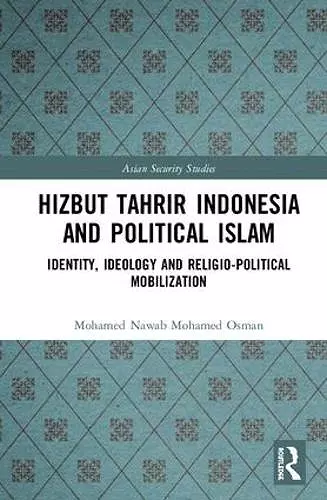Hizbut Tahrir Indonesia and Political Islam
Identity, Ideology and Religio-Political Mobilization
Mohamed Nawab Mohamed Osman author
Format:Hardback
Publisher:Taylor & Francis Inc
Published:31st May '18
Currently unavailable, and unfortunately no date known when it will be back
This hardback is available in another edition too:
- Paperback£43.99(9780367666668)

This book offers a timely examination of Hizbut Tahrir Indonesia (HTI), a chapter of the transnational movement Hizb ut-Tahrir (HT), whose key aim is the revival of the caliphate.
It cautions against an overly simplistic read of a group like HTI and political Islam in Indonesia. While there is much to laud, particularly with regard to how leaders in Indonesia have attempted to counteract Islamist extremism, insofar as the trajectory of non-violent Islamism in Indonesia is concerned there are clear reasons for apprehension. Groups like the HTI have been adept at using the democratic space in Indonesia to propound their illiberal objectives, including encouraging the curtailment of Indonesian art forms deemed un-Islamic, and more importantly pushing for certain Islamic sects, such as the Ahmadiyahs, to be banned. Yet, despite its extreme posturing, HTI is
accepted as a mainstream Muslim organization. As such, the Indonesian chapter of Hizb ut-Tahrir represents a unique case: unlike other chapters, which are deemed extreme and fringe, HTI, though radical, still exists within the space provided by the Indonesian religio-political landscape.
This book offers new insights into HTI’s history, organizational structure and ideology, adding considerable new details about HTI and correcting errors in existing literature, while directing its primary focus on explaining HTI’s rapid growth in Indonesia. The central argument is that the key to understanding HTI’s growth lies in the role collective identity plays in attracting new members and retaining its existing members within the party. Factors such as institutional and non-institutional opportunities within the Indonesian political system, HTI’s resource mobilization strategies and the anti-systemic ideology of HTI serve as political, organizational and religious incentives for individuals to join the party and launch collective action. This goes on to emphasize and show that collective identity remains the most crucial factor in the party’s growth. Analysing this process of collective identity formation and its impact on recruitment and membership retention is central to this book.
This book will be of much interest to students of Southeast Asian politics, regional security, political Islam, and International Relations in general.
'This is a terrific book, likely to be widely cited as the best if not the definitive study of Hizbut Tahrir Indonesia (HTI), an Islamist organization recently banned by the Indonesian government. A main strength is the high quality of the interviews, conducted with more than 100 HTI leaders and members, whose confidence the author clearly gained. Balanced and analytical, the book is also theoretically innovative, bringing a new conceptualization of ideology to social movement theory. Not least, its substantive conclusion that HTI is non-violent is persuasive, showing why the recent ban is likely to be counter-productive.'-- Bill Liddle, The Ohio State University, USA
Nawab has captured the inner workings of a global Islamist ideological movement and how it lands in a populous nation like Indonesia. The Hizbut Tahrir is an incubator group for a variety of trends within contemporary Islam and highly relevant to our understand of the intersection of religion and politics. Fascinating details of internal conflict, rivalries and the jockeying for power emerge in this well-researched and deserving book.'-- Ebrahim Moosa, Professor of Islamic Studies, Keough School of Global Affairs, University of Notre Dame, USA
'Mohamed Nawab Mohamed Osman wrote a very original and ground-breaking book: he shows how a specific form of Islamist radicalization came to Indonesia from the West; his book illustrates the sudden shift from traditional home-grown Muslim movements, well rooted into the Indonesian culture and society, to a global phenomenon of religious radicalism that finds an appeal among a youth that has lost its connexion to the past.'-- Oliver Roy, European University Institute, Italy
ISBN: 9780815375289
Dimensions: unknown
Weight: 476g
236 pages